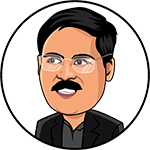

DevTernity is the top international software development conference.
We focus on the core skills paramount to your success – coding, architecture, and leadership.
Start preparing for an architect, engineering leader, or CTO role today.
it's a must-see.
No Agile bullshit bingo and marketing talks permitted. See for yourself:

Consultant, Trainer, Writer, Editor of 97 Things Every Programmer Should Know
Code?
In this session, Kevlin will explore what we do and do not mean by code, and the consequences for development and our systems. Some developers do not consider their unit tests to be proper code, because unit tests are not shipped with the software. On the other hand, many developers do not consider configuration to be code, even though it is shipped with the software, defines how the software executes and is written in a formal notation. And imagine deploying a system with millions and millions of configuration parameters that none of the developers understood or knew how to test properly? Imagine machine learning. This talk is a journey into code, a journey into testing, a journey into quality and a journey into keeping software soft. There's no need to make it harder than it already is.

VP Engineering and Chief Architect @ eBay, ex-Director of Engineering @ Google
Improving eBay's Development Velocity
This session outlines eBay’s efforts towards better, faster, safer, and continious software delivery. You'll learn about measuring software delivery, reducing waiting times and improving flow, breaking down silos, removing impediments, embedding experts directly in product teams, modernizing architecture, and much more! This session will provide actionable insights for other organizations going through similar journeys.

Solution Architect, Developer and Mentor at Bottega IT Minds, ex-Head of Software Development @ 4Finance
Simple and Powerful Things That Work for Me
There's a surprising lot of best practices that are irrelevant in practice. There are also those that do not sound like much, but I use them every single day and cannot imagine how I would deal without them. This talk is about those silent game-changers. I'll talk about fixing bugs with a scientific method, how 7 years of implementing and operating microservices changed my observability practices, and how higher-order functions allowed me to not only express what's important, but also put emphasis on it. And then we'll talk a bit about neuroscience and how to deal with your own head. Perhaps it will work for you as well.

Software Craftsman, Java Champion, and Independent Technical Trainer
The Secrets of the Fastest Java Developers on Earth
In this session, you’ll learn a lot of hands-on tricks that will skyrocket your Java coding speed, after just several days of practice. Writing, editing, navigating and refactoring code faster will let you focus on your goals and allow you to experiment various design alternatives without wasting precious time. In this talk I’ll demonstrate some the best tricks of IntelliJ (community included): Advanced Auto-Completion: over-dot, TAB, type-aware, statics, generating boilerplate, Live Templates and Postfix Expansion, Essential quickfixes and inspections, Multi-cursor, Statement Completion, Navigating Code like a Pro, Java Streams support, and many more, all curated with the help of many nice JetBrains people.

Principal Technologist @ VMWare, Trainer @ Bottega IT Minds, DZone's Most-Valuable Blogger
Clean Code: Eternal Principles
In this talk we will cover: thinking in terms of abstractions, placing the right language in right places, fighting with cognitive load and biases, what kinds of coupling can we see and which one is the worst, how to overcome the fear of having many small classes, hot to explain cohesion to a junior developer and more. Those evergreen rules can help you become more efficient and persuasive at work.

Consultant, Trainer, Author of Running Serverless, Specification by Example, Impact Mapping, Founder of Narakeet
Maximum Impact, Minimum Effort
A big government IT project delivered two years ahead of schedule. A fraud detection initiative saving tens of millions more than predicted. An app that helped a city rebuild faster after a major disaster and save ten times more money than expected. Stories like these are very uncommon, even with all the advancements the software industry made in the last few decades. In this talk, Gojko will present how very successful teams create big impacts with minimum effort. You'll get practical, actionable ideas that you can use immediately in your work.

Founder @ Agile Developer, Author of Practices of an Agile Developer, Programming Concurrency on the JVM, Functional Programming in Java
Reasons and Ways to Improve Code Quality
As programmers we crank out code day in and day out. In the pressure to deliver faster and to keep up with change, it's easy to forget about code quality. Over time, we may not even realize how much the code has deteriorated except that we feel the pain moving forward, as with each line of code we touch gets harder and slower to change. We will discuss the reasons to maintain good quality code and ways in which we, each one of us, can be part of creating quality code.

Head of Developer Relations @ Checkly, Teaching @CSSclasses, Maintaining @perf_tooling
Everything You Should Know About Web Development in 2022
Frontend and JavaScript technologies are moving fast. So fast that it's always hard to keep track of all the new things that are coming up. This talk will show new tools, workflows, ways to develop and give advice on how to stay up to date.

Software Craftsman and Founder @ Codurance, Author of The Software Craftsman
Minimum Viable Professional
In this session, together with Sandro we'll discuss hard and soft skills that every software craftsperson needs and how can we nurture those skills independently, at work, and as a community.

Founder @ ReactJS Consulting, Software Developer, Author, Speaker, Consultant, Teacher
The 7 Pillar Developer: A Holistic Approach to Building an Exceptional Career
As developers, we focus on code. Yet mastering syntax alone isn't sufficient. Our behaviors away from the keyboard profoundly effect our impact and career satisfaction. So, to dramatically expand our potential as developers, we must reconsider our behaviors as a humans. In this story-oriented session, we'll explore seven surprisingly relevant facets of life that profoundly impact our software quality.

Chief Architect @ Headspring, Microsoft MVP, Creator of AutoMapper
Effective Microservice Communication and Conversation Patterns
Orchestration or Choreography? Sagas or process manager? REST, RPC or Events? Are we just making this all up as we go along? Once we move away from a single process to many services and processes, we immediately hit the problem that our services need to communicate with each other. The architect mandated REST! But then nothing worked in production. Then came events! And nothing ever completed. In this talk we'll look at the problem from a holistic perspective - take the fundamental property of autonomy for any microservice-based architecture, and design how services should communicate so that they can still achieve their purpose in the world. We'll cover basic communication patterns, where we run into problems with them, and how advanced conversational patterns can help. Finally, we'll look at some real-world scenarios for designing complex coordination and where conversation patterns can retain our autonomy and loose coupling.

Principal Developer Evangelist @ Pluralsight, Microsoft MVP
Practical Leadership for Software Developers
Regardless of the technology you know, regardless of the job title you have, you have amazing potential to impact your workplace, community, and beyond. In this talk, I’ll share a few candid stories of my career failures… I mean… learning opportunities. We’ll start by debunking the myth that leadership == management. Next, we’ll talk about some the attributes, behaviors and skills of good leaders. Last, we’ll cover some practical steps and resources to accelerate your journey. You’ll walk away with some essential leadership skills I believe anyone can develop, and a good dose of encouragement to be more awesome!

Master Craftsman, Author of Clean Code, Clean Architecture, The Clean Coder, and Clean Agile
Clean Architecture – A Craftsman's Guide to Software Structure
By applying universal rules of software architecture, you can dramatically improve developer productivity throughout the life of any software system. Now, building upon the success of his best-selling books Clean Code and The Clean Coder, legendary software craftsman Robert C. Martin reveals those rules and helps you apply them.

Software Architect, F# Trainer, Author of Domain Modeling Made Functional
Domain Modeling Made Functional
Statically typed functional programming languages encourage a very different way of thinking about types. The type system is your friend, not an annoyance, and can be used in many ways that might not be familiar to OO programmers. Types can be used to represent the domain in a fine-grained, self documenting way. And in many cases, types can even be used to encode business rules so that you literally cannot create incorrect code. You can then use the static type checking almost as an instant unit test — making sure that your code is correct at compile time. In this talk, we'll look at some of the ways you can use types as part of a domain driven design process, with some simple real world examples in F#. No jargon, no maths, and no prior F# experience necessary.

Author of Lean Software Development, Implementing Lean Software Development, Leading Lean Software Development, and The Lean Mindset
The Future of Software Engineering
Twenty years ago Google was struggling to search the vast amount of data in the web, while Amazon was struggling to move an increasing volume of transactions through its monolithic architecture. Their solutions broke new ground in software engineering even as they enabled the companies to thrive. Creative approaches to digital technology have been fundamental in enabling the massive scale and incredible speed of today’s digital giants. More than that, they are at the core of every successful digital transformation. This talk will discuss how software engineering has been changed by the scale and speed required of digital companies in the past, now, and in the future.

Software Coach, Mentor and Consultant, TDD Trainer tdd.training
Unlocking the Awesome Power of Refactoring
Many programmers get stuck when they try to learn evolutionary design, particularly the refactoring part of it. It never seems to get easier, it never seems to go faster, and so it always seems safer to rip things apart and write them again. If you or someone you know feels stuck like this, then let's talk about why that happens and what to do about it. I'm pretty sure that will also provide a nice starting point for larger discussions about our work as programmers, how evolutionary design (TDD, refactoring) fits in, and anything else that we feel vaguely interested in talking about. My brain will be open.

Chief Product Officer @ Stealth Startup, ex-Engineering Leader @ Confluent, Author of Kafka: The Definitive Guide
Beyond Microservices: Streams, State and Scalability
Microservices have been a popular architecture choice for at least 5 years by now. Over these years we've adopted microservices architectures to ever growing set of use-cases and different development and deployment strategies. Lessons were learned and our ability to design, develop, deploy and operate microservices has improved. This presentation will give an opinionated view of how microservices evolved in the last few years, based on experience gained while working with companies using Apache Kafka to update their application architecture. We'll discuss the rise of API gateways, service mesh, state management and serverless architectures - what works well, and in which cases. We'll show real-world examples of how applications become more resilient and scalable when new patterns are introduced, and make sure to include caveats - because patterns are all about using them in the right context.

Senior Director of Engineering @ Google
Engineering Management: The Missing Manual
Managing engineers isn't hard once you have the missing instruction manual. In this talk, Dave will explain why people act the way they do and how you can navigate common (and uncommon) management situations with a few basic principles.

Creator of Extreme Programming and TDD, Author of TDD by Example and Extreme Programming Explained
Extreme Programming — 25 Years Later
Kent Beck invented Extreme Programming. In this session, he'll share what he got right, what he got wrong, and what he's still working on.

Principal Community Architect for Web Platform @ Microsoft, Blogger, Podcaster
Building Careers with Empathy
In this session, Scott Hanselman will share his career journey from a programmer to a Lead .NET Program Manager at Microsoft. Expect some (unusual) advice on skills and practices you need to succeed.

Principal @ Hollub Associates Ltd, Pluralsight Author, Author of Design Patterns in the Real World course
26 Heuristics for Effective Software Development
In this talk, you’ll learn how to leverage Allen Holub’s 26 rules of thumb to create a highly effective software organization. You’ll learn how to infuse real agility (as compared to “Agile”) into your organization.
Our instructors are here to deliver full-day practical workshops. Choose one that you like more:
Functional programming can be an excellent approach to designing decoupled, reusable systems with a rich domain model. This workshop will show you why and how.
You'll learn the core concepts of FP, and how to apply them to crafting domain logic, capturing business rules, designing business workflows, error handling, and much more, including:
Note: We will be using F# as our development language. The principles will be applicable to other languages. No experience with F# needed.
Note: this workshop runs from 9:00 until 16:00. Buy
 |
Scott Wlaschin
Software Architect, F# Trainer, Author of Domain Modeling Made Functional
|
Understand the concepts of DDD but feeling overwhelmed to implement? Feeling overwhelmed by complex examples and can't connect how to implement DDD in your project? Looking for more concrete guidance on the concepts and principles of DDD and want to learn how to connect it to real-world code? If this sounds familiar, then this workshop is for you. We cover both the theory and patterns of Domain-Driven Design, and connect it to code with hands-on examples in .NET 6. The described concepts will be applicable to other languages and platforms. In this workshop, you'll learn:
Note: We will be using .NET as our development platform. The principles will be applicable to other languages and platforms.
Note: this workshop runs from 14:00 until 20:00. Buy
 |
Jimmy Bogard
Chief Architect @ Headspring, Microsoft MVP, Creator of AutoMapper
|
Are you struggling with your codebase which causes problems like poor maintenance, unreadability, performance, and poor testability? After this workshop, you will be ready to identify and repair architectural and code root causes of those issues using proven patterns and techniques from Domain-Driven Design, Test-Driven Development, Object-Oriented Programming, and modularization. During code exercises, we will walk through solutions to issues like:
The workshop will start with code that represents a huge legacy system that some of us have to work with on a daily basis. We will gradually refactor it and not only introduce patterns like CQRS, aggregates, policies, and parallel change, but also walk through how to talk about refactoring, technical debt, and how to sell our ideas to management.
Note: The course is for developers able to code and complete exercises in Java, C#, or PHP.
Note: this workshop runs from 14:00 until 20:00. Buy
 |
Jakub Pilimon
Principal Technologist @ VMWare, Trainer @ Bottega IT Minds, DZone's Most-Valuable Blogger
|
We all have legacy code – profitable code that we’re afraid to change. Rewrite or refactor? How to crack the chicken-and-egg problem (I need to write tests in order to refactor, and I need to refactor in order to write tests)? What to do when we're already behind the schedule? We need a way to learn how to work with legacy safely, correctly, and quickly. That’s what Surviving Legacy Code is about.
In this workshop, you'll be working on a diabolical-but-fun code base and practicing different refactoring and testing techniques – from basic to advanced ones. Learned techniques will eventually help you improve your production codebase – safely and quickly enough.
Note: this workshop runs from 11:00 until 17:00. Buy
 |
J.B. Rainsberger
Software Coach, Mentor and Consultant, TDD Trainer tdd.training
|
The goal of this intensive, hands-on workshop, is to deepen your understanding of SOLID and other core software design principles and patterns. You'll be practicing those concepts under different constraints and requirements, devising elegant lightweight design, writing code, and discussing the tradeoffs.
Come experience the evolution of ideas into clean code by way of incremental development!
Note: this workshop runs from 9:00 until 16:00. Buy
 |
Venkat Subramaniam
Founder @ Agile Developer, Author of Practices of an Agile Developer, Programming Concurrency on the JVM, Functional Programming in Java
|
We all have an opportunity every day to make a postive impact on folks around us. These are often called "soft skills," but they can be some of the hardest to learn! We could call them "people skills," "essential skills," or "core skills." But, how about "SKILLS OF AWESOMENESS?" Yes, what we all need is more ways we can be awesome to each other, and awesome together. You'll learn:
Through a series of practical exercises, we will discover and discuss the most important and relevant topics you want to cover, so that you can get the most value out of this workshop! The workshop is led by David Neal – #1 speaker of 2020.
Note: this workshop runs from 9:00 until 16:00. Buy
 |
David Neal
Principal Developer Evangelist @ Pluralsight, Microsoft MVP
|
In this workshop, through code examples, hands-on exercises, and discussions you'll learn how to design a clean and pragmatic architecture. The topics include:
This workshop uses Java as a reference language.
Note: this workshop runs from 8:00 until 16:00. Buy
 |
Victor Rentea
Software Craftsman, Java Champion and Trainer
|
Every system has an architecture, whether accidental or intentional, and regardless of whether it was put in place by a nominated architect or whether it emerged from the decisions and discussions of a team. All too often the focus of what is often described as architecture is centred around a specific set of platform technologies, which forms only one part of the set of concerns an architecture should. And all too often architecture is seen as a separate concern from development process, whereas the two are intertwined — what you build is influenced by how you build it, and vice versa. The course covers a wide range of topics through a number of practical exercises, with plenty of time dedicated to group discussion:
Note: this workshop runs from 9:00 until 16:00. Buy
 |
Kevlin Henney
Consultant, Trainer, Writer, Author of 97 Things Every Programmer Should Know
|
In this workshop, I’ll take you through three different styles of enterprise service architecture: modular monoliths, distributed synchronous systems, and event-driven systems. Together, we will design a non-trivial backend system and find out the strengths and weaknesses of each architectural approach. We will discuss the typical mistakes and problems developers face during service architecture design and how to solve them. You will learn how to choose the best architecture style for your project, and how to design hybrid solutions, leveraging the best parts of each architecture style. Topics include:
This workshop covers fundamental concepts, relevant to all programming platforms and languages; developers and architects with different backgrounds can attend.
Note: this workshop runs from 9:00 until 16:00. Buy
 |
Jakub Nabrdalik
Solution Architect, Developer and Mentor at Bottega IT Minds, ex-Head of Software Development
|
You can’t simultaneously fight your code and be Agile—it slows you down too much. Your code’s design must evolve incrementally along with your understanding of the product. In this workshop, you’ll learn everything you need to create highly adaptable designs literally as you implement them. Along the way, you’ll also experience Event Storming and other Domain-Driven Design techniques.
In all, you’ll learn how to build a coherent and highly maintainable system and architecture that can easily accommodate changing requirements and grow incrementally as the system evolves.
Note: this workshop runs from 14:00 until 19:00. Buy
 |
Allen Holub
Principal @ Hollub Associates Ltd, Pluralsight Author, Author of Design Patterns in the Real World course
|
We are partnering with amazing companies that have continuous learning and innovation in their DNA.
At JetBrains, code is our passion. Ever since we started, back in 2000, we have strived to make the strongest, most effective developer tools on earth. By automating routine checks and corrections, our tools speed up production, freeing developers to grow, discover and create.
BET Software is one of the most diverse betting software providers in Sub-Saharan Africa, with a growing presence internationally. We are the workplace of choice for technologists and engineers due to our pioneering use of technology, our talented Team and the innovative solutions we deliver.



